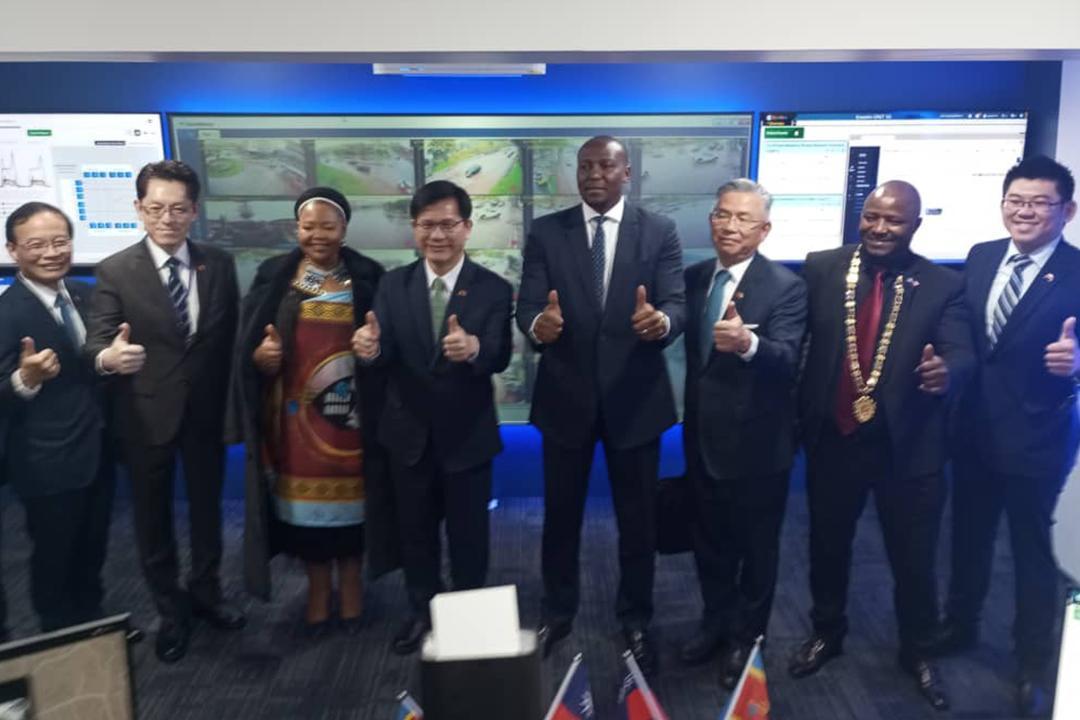Africa-Press – Eswatini. From real-time surveillance to smarter roads and climate warnings, the face of the capital is changing, and fast.The Kingdom of Eswatini on Thursday morning officially launched the Government 5G Network and Mbabane Smart City Project, ushering in a bold new era of digital transformation.
The high-level event, held at the Municipal Council of Mbabane, was attended by Prime Minister Russell Mmiso Dlamini, the visiting Taiwanese Minister of Foreign Affairs Dr Lin Chia-lung, Cabinet ministers, senior government officials, Taiwanese delegates, and key stakeholders. The ceremony marked the formal handover of the technology-driven project, made possible through a $2 million (E38 million) grant from the Republic of China (Taiwan).
The Prime Minister, accompanied by Dr Lin, activated the 3D digital bowl in a symbolic gesture to officially launch the initiative, which has already seen the installation of 57 surveillance cameras around Mbabane. The cameras form part of a broader smart infrastructure that is expected to enhance urban security, traffic monitoring, and city management.
“This isn’t just about faster internet,” Dlamini said, explaining that the 5G network will serve as the foundation for a truly smart city, one that is safer, more efficient, and more responsive to the needs of its residents.
He noted that the Mbabane Operations Centre is now fully operational, with real-time surveillance capabilities that will significantly improve crime prevention and emergency response. The centre will also monitor weather and water conditions using solar-powered sensors strategically placed along the Mbabane River.
“These innovations will allow us to issue early warnings during heavy rainfall and possible flooding,” he said, adding that the city is embracing the Fourth Industrial Revolution with open arms.
Public access to digital services is also a key priority. The next phase of the project includes free Wi-Fi hotspots across the city, enabling up to 200 users per site to connect simultaneously at speeds of up to 1 Mbps.
Mbabane Municipal Council CEO Gciniwe Fakudze assured residents that the smart technologies were being implemented with respect for citizen privacy. She stated that the data collected from the cameras would be treated with the highest confidentiality. “We are prioritizing the safety and dignity of every citizen,” she emphasized.
Fakudze also paid tribute to His Majesty King Mswati III, saying the project was a direct response to the “Nkwe” call he issued – a call that mobilized strategic partnerships and national action. “The King did not just speak, he acted, and Taiwan stood by us,” she said.
Taiwan’s Foreign Minister, Dr Lin Chia-lung, echoed these sentiments during his address, saying the Smart City project would dramatically improve the efficiency of urban governance. “Taiwan can help, but Eswatini can lead,” he said, reinforcing Taiwan’s continued support for Eswatini’s digital future.
Dlamini, in turn, expressed profound gratitude to the Government of Taiwan and hailed the collaboration among key local institutions including the Ministry of ICT, Ministry of Housing and Urban Development, EPTC, the Royal Science and Technology Park, and International Integrated Systems Inc.
He urged the Mbabane Municipality to maintain high standards in managing the city’s new systems, noting that as the first smart city in Eswatini, it must set the pace for others to follow.
The broader vision, he said, is to extend the smart city model to towns such as Manzini, Matsapha, Nhlangano, and Siteki. Quoting the siSwati proverb “Ingoma lemnandzi iyaphindvwa,” he said a good initiative must be repeated, and Eswatini’s digital evolution was far from over.
Under the coordination of the Ministry of ICT, the project integrates smart governance, smart mobility, and e-health solutions, with plans for smart transportation systems powered by AI and data analytics already underway. Traffic intersections will soon be monitored through integrated systems to ease congestion and improve road safety.
The project timeline includes the signing of agreements in Taipei in March 2024, the commissioning of the operations centre in May 2025, and the final rollout of the 5G network by March 2026.
As the dust settles on this groundbreaking launch, one thing is clear: Mbabane just got a whole lot smarter, and the rest of Eswatini is ready to follow.
For More News And Analysis About Eswatini Follow Africa-Press







